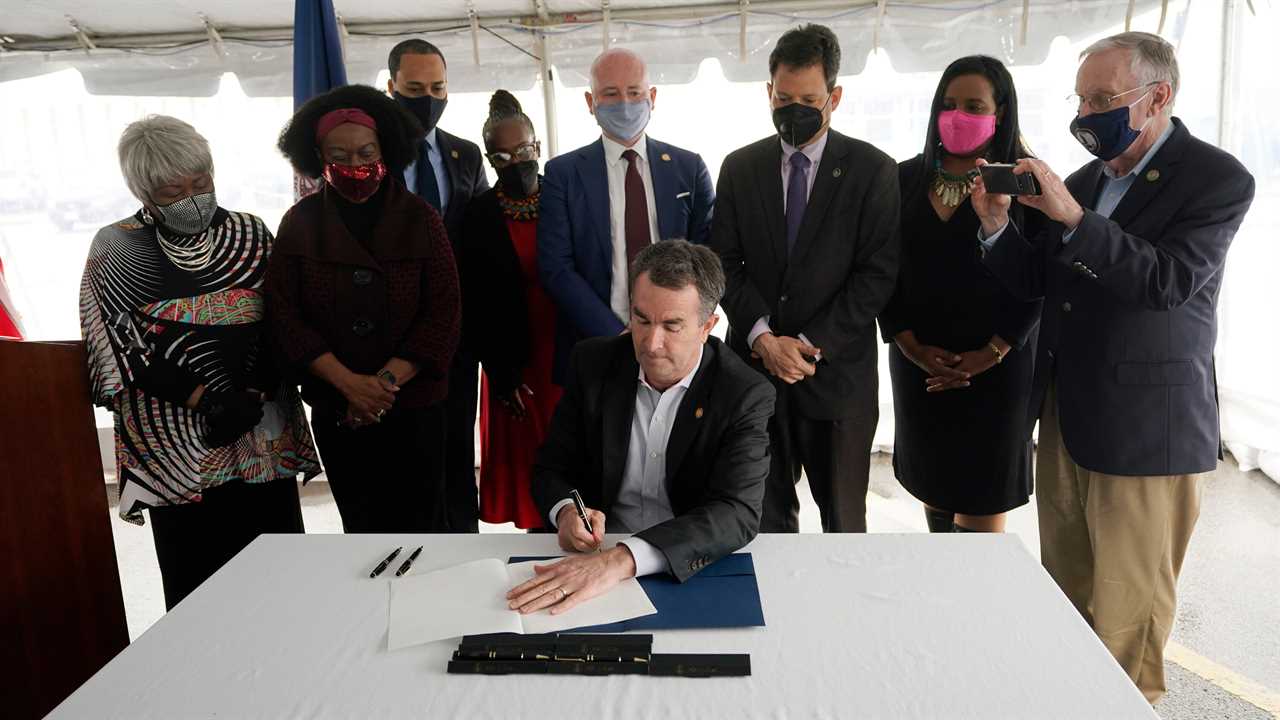
WASHINGTON — Gov. Ralph S. Northam on Wednesday signed a bill that abolished the death penalty in Virginia, making it the first Southern state and the 23rd overall to end capital punishment amid rising opposition to the practice.
Before signing the bill, Mr. Northam pointed to Virginia’s 413-year history of capital punishment, during which it executed more than 1,300 inmates, more than any other state. He also noted racial disparities in the use of the death penalty: During the 20th century, he said, 296 of the 377 inmates Virginia executed for murder — or about 79 percent — were Black.
“Ending the death penalty comes down to one fundamental question, one question: Is it fair?” Mr. Northam said after he completed a tour of the state’s execution chamber. “For the state to apply this ultimate, final punishment, the answer needs to be yes. Fair means that it is applied equally to anyone, no matter who they are. And fair means that we get it right, that the person punished for the crime did the crime.”
“But,” he added, “we all know that the death penalty cannot meet those criteria.”
The bill’s signing comes as President Biden faces pressure from members of his own party to commute the sentences of the remaining inmates on federal death row. It also follows a spate of executions carried out by the Trump administration that renewed calls from the left to abolish capital punishment.
In its final months, the administration executed 13 inmates, more than a fifth of the prisoners that the Bureau of Prisons considered to be on death row. The inauguration of Mr. Biden — who promised during the campaign to work to end federal capital punishment — almost certainly marked the end of that string of executions.
But what Mr. Biden plans to do with the remaining condemned inmates remains unclear. It is also uncertain how he will handle the cases in which the Justice Department has advocated the death penalty, such as that of Dzhokhar Tsarnaev, one of the Boston Marathon bombers. His new attorney general, Merrick B. Garland, has also expressed concerns about the death penalty.
If Virginia is any indication, Republican support for abolishing capital punishment at the federal level is unlikely. The move has been criticized by some in the party who resent the compassion shown for perpetrators of heinous crimes. During a hearing in the Virginia House of Delegates last month, Delegate Robert B. Bell, a Republican, noted that two people watched the debate over the death penalty with “rapt attention”: Anthony Juniper and Thomas A. Porter, the last two men on Virginia’s death row.
Both were convicted of grisly murders. Mr. Porter shot a police officer in the head three times in October 2005, killing him and stealing his service pistol before fleeing in a Jeep. Mr. Juniper committed a quadruple murder in 2004, during which he shot a 2-year-old in her mother’s arms four times and her 4-year-old sister, along with their mother and uncle.
The inmates’ cheering “could metaphorically be heard at the grave sites of those five crime victims,” Mr. Bell said during the hearing. “We have five dead Virginians that are not, that this bill will make sure that their killers do not receive justice.”
The bill, which the Virginia House and Senate passed last month, stipulates that the sentences of the remaining death row inmates be converted to life in prison without eligibility for parole. The inmates will also not qualify for good conduct allowance, sentence credits or conditional release. Where there were once dozens of prisoners on the state’s death row, now there will be none. The last man to be put to death by the state was William Morva, an escaped prisoner who killed an unarmed hospital security guard and a corporal participating in his manhunt. He was executed in 2017.
On Wednesday, State Senator Scott Surovell, a Democrat, visited the execution chamber for the first time since the early 1990s, when he toured the facility as a governor’s fellow. The gurney was new, Mr. Surovell said, adding that the same wooden chair remained but that there were also at least two digital clocks on the white walls that he did not recall.
One hundred and two prisoners were executed in that chamber since its opening in 1991, according to the governor’s office. Mr. Surovell, who introduced the legislation in the Senate, said the gurney and the chair should be displayed in a museum.
“People are going to be looking at them going, ‘What in the world were those people thinking doing that?’” he said. He compared Virginia’s historical use of the death penalty to the Trump administration’s spasm of executions in its final months.
Todd C. Peppers, a professor at Roanoke College who has written extensively about the death penalty in Virginia, said the Supreme Court had long served as a more significant check on the state’s use of the death penalty than any change in public opinion. In 2000, the state executed a man who was 17 when he murdered his girlfriend’s parents. About five years later, the Supreme Court ruled that the execution of those who were minors at the time of their crimes was unconstitutional. Additionally, a case out of Virginia prompted the Supreme Court in 2002 to abolish the death penalty for those with intellectual disabilities.
“It’s a long, bloody history, and it’s astonishing that a state like Virginia, a former Confederate state, a state that so enthusiastically embraced the death penalty, is abolishing it,” Mr. Peppers said. “I never thought I’d see this.”






